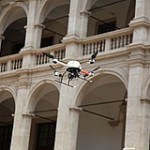 :
:
In this talk he will first introduce Time-Frequency Logic (TFL), a new specication formalism for real-valued signals that combines temporal logic properties in the time domain with frequency-domain properties. He will then present a property checking framework for this formalism and demonstrate its ex- pressive power to the recognition of musical pieces. Like hybrid automata and their analysis techniques, the TFL formalism is a contribution to a unied systems theory for hybrid systems.
This is joint work with Alexandre Donze, Oded Maler, Dejan Nickovic, Ezio Bartocci and Scott Smolka.
Radu Grosu is a Professor and Head of the Dependable- Systems Group at the Faculty of Informatics of the Vienna University of Technology, and a Research Professor at the Computer Science Department of the State University of New York at Stony Brook. His research interests include modeling, analysis and control of cyber-physical and biological systems and his application focus includes green operating systems, mobile ad-hoc networks, automotive systems, the Mars rover, cardiac- cell networks and genetic regulatory networks. Grosu is the recipient of the National Science Foundation Career Award, the State University of New York Research Foundation Promising Inventor Award, the ACM Service Award, and a member of
the International Federation of Information Processing WG 2.2. Before receiving his appointment at the Vienna University of Technology, Grosu was an Associate Professor in the Computer Science Department of the State University of New York at Stony Brook, where he co-directed the Concurrent-Systems laboratory and co-founded the Systems-Biology laboratory. Grosu earned his Dr.rer.nat. in Computer Science from the Technical Univer- sity of Mu?nchen, and was a Research Associate in the Computer Science Department of the University of Pennsylvania.
 Prof. Dr.-Ing. Daniele Nardi
Prof. Dr.-Ing. Daniele Nardi
Small UAVs for Emergency Response
Wednesday, February 24th 2010
11:00, Room L4.1.114
Lakeside Labs.
The talk addresses the potential for application of small UAVs, such as quadrotors, for emergency response. We initially analyze a number of emergency scenarios and motivate the need for situation awareness, in order to plan and monitor the actions of the emergency response team. We argue that small UAVs can be effectively deployed to improve the situation awareness, and, consequently, the performance of the operation. Besides the flying and control capabilities of the platform, a key issue for the development of eff
ective solutions in t
building :: Top Conversions & Payouts’>Combat The Fat + Advanced Bodybuilding :: Top Conversions & Payouts
he targeted domain, is the ability to easily develop software that acquires data on the scenario in such a way as to maximize the amount of knowledge for the operator. Specifically, we describe the main features of the OpenRDK framework for developing robotic applications, implemented at Sapienza Univ. Di Roma, and currently distributed to a few other research groups. Moreover, we present some examples developed through OpenRDK on our experimental quadrotor system. We conclude by addressing future research, and, in particular, forms of cooperation in robotic teams including UAVs.
Biography:
Daniele Nardi is Full Professor at Facoltà Ingegneria, Sapienza Univ. Roma, Dipartimento Informatica e Sistemistica, since 2000. His current research interests are in Artificial Intelligence, Cognitive Robotics, Multi-Agent/Multi-Robot Systems and Search and Rescue Robotics. He is author of more than 100 scientific publications, recipient of „IJCAI-91 Publisher’s Prize“ and of Prize „Intelligenza Artificiale 1993“ and ECCAI Fellow. He is currently Vice President of RoboCup Federation, Coordinator of the Curricula in Computer Engineering at Sapienza Univ. Roma and Director of the research laboratory „Cognitive Robot Teams“.
zp8497586rq
zp8497586rq
zp8497586rq


 Prof. Dr.-Ing. Daniele Nardi
Prof. Dr.-Ing. Daniele Nardi